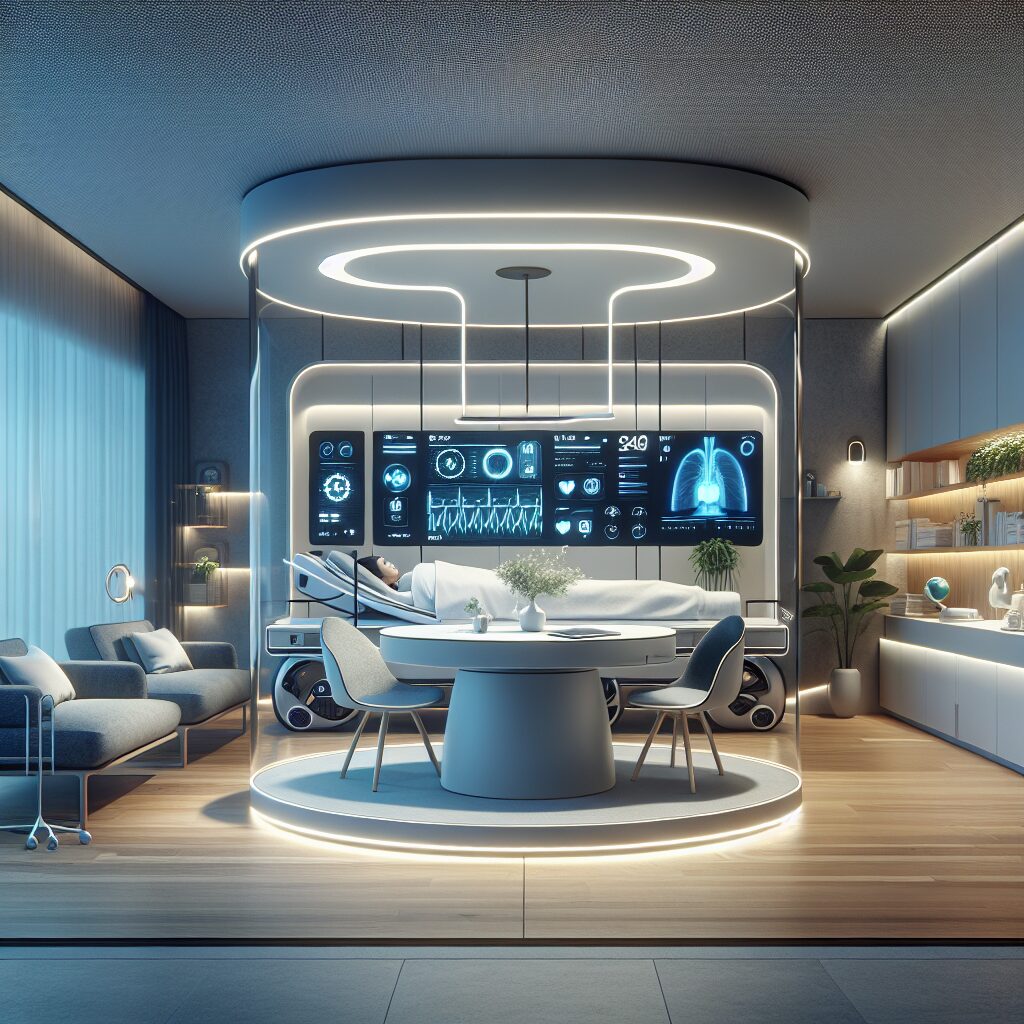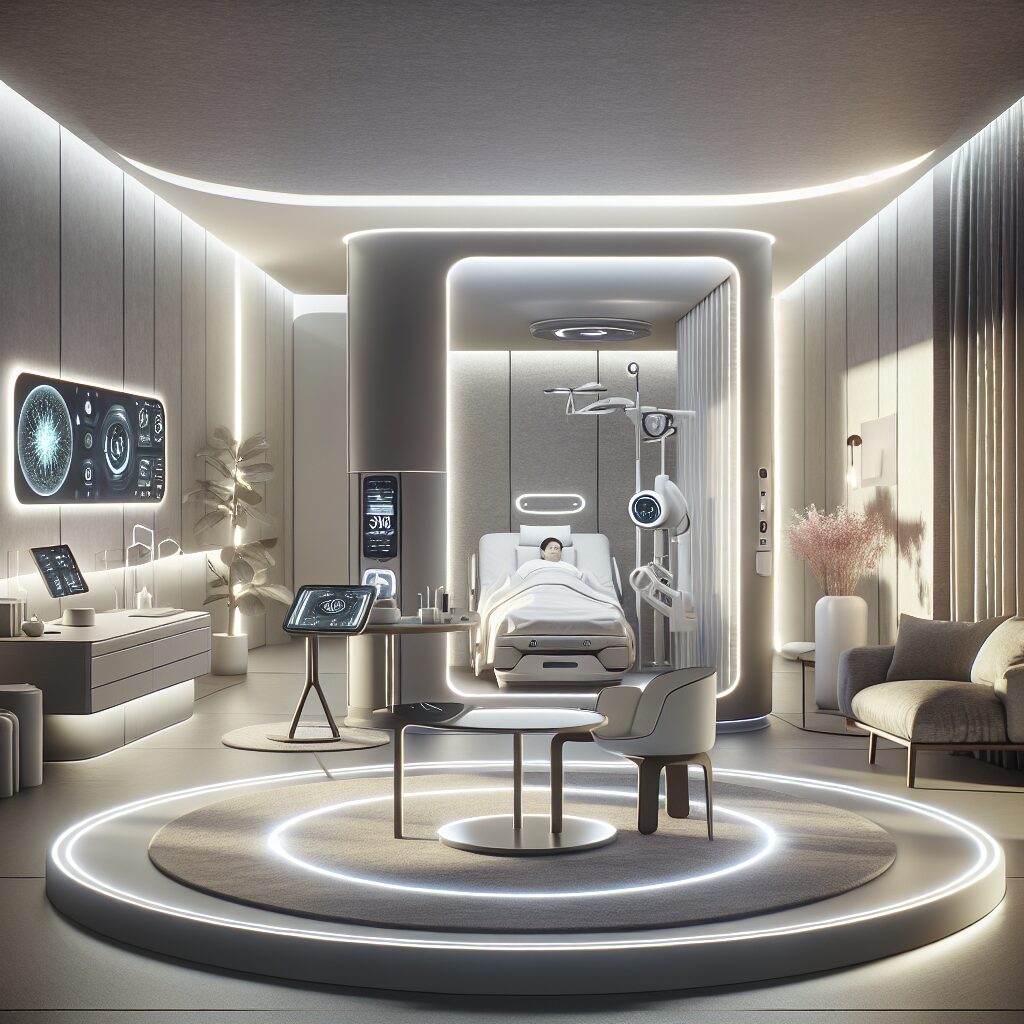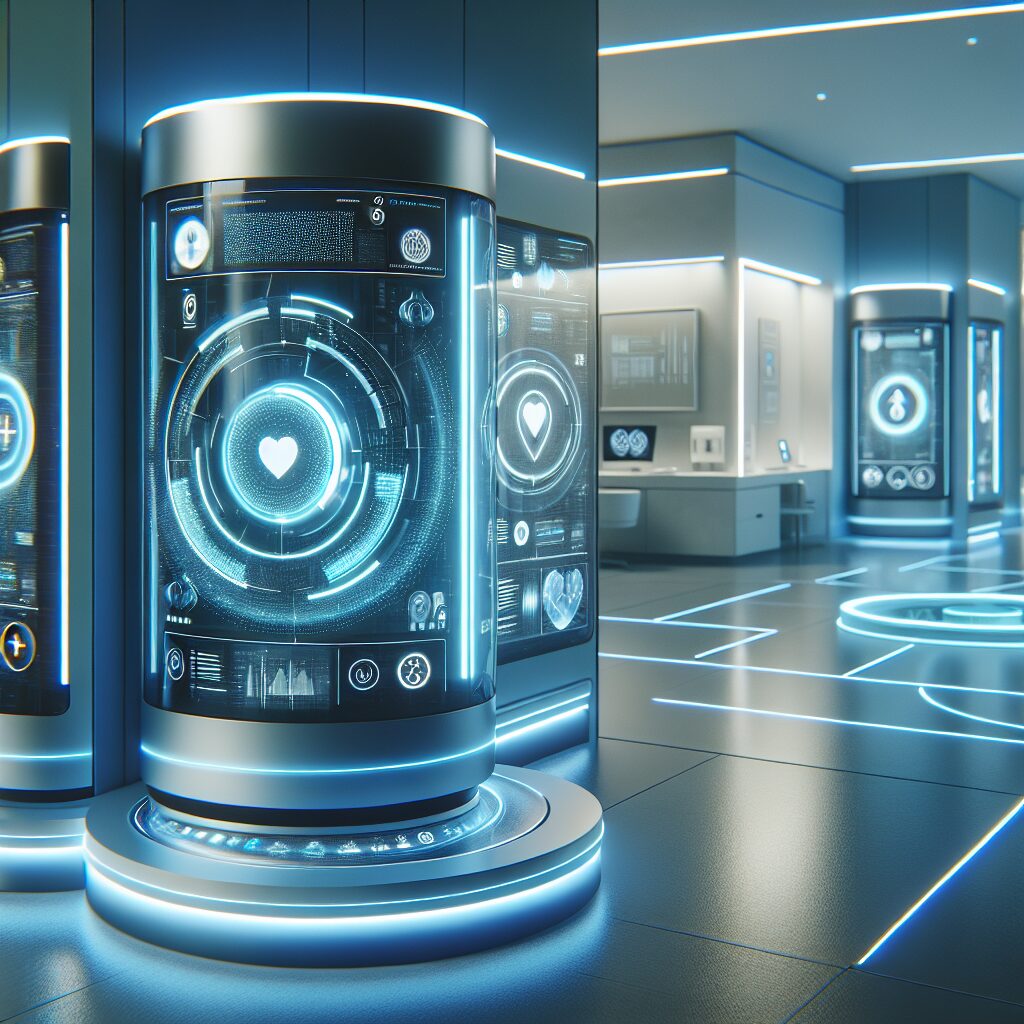
Revolutionizing Home Health Care with Technology
In today’s world, smart home systems have become an integral part of our lives, extending their influence far beyond comfort and convenience. They are now shaping the future of healthcare, offering personalized care right at home.
Empowering Patients: These smart homes integrate Internet of Things (IoT) devices to put power back in the hands of patients, enabling self-monitoring and real-time access to their health data.
Medical sensors collect vital signs, while user-friendly health monitoring apps provide a comprehensive yet easy-to-understand interface for complex medical information.
Telehealth Revolution: Telemedicine is revolutionizing the way patients interact with healthcare professionals.
It allows them to consult remotely via telehealth platforms, eliminating the need for frequent in-person visits and bringing convenience, faster response times, and improved access to care – especially for remote or underserved populations.
The Role of Wearable Technology: Wearable devices are taking healthcare monitoring to a whole new level.
They track various health indicators such as heart rate, blood pressure, and sleep patterns, providing continuous monitoring and enabling predictive analytics for early identification of potential health issues.
Remote Patient Monitoring: Healthcare providers can now closely monitor patients’ health conditions from a distance using remote patient monitoring tools.
This proactive approach leads to reduced hospitalizations, improved quality of life, and cost savings not only for patients but also for insurance companies.
In essence, smart homes are transforming home healthcare by offering innovative solutions that cater to the needs of patients while improving efficiency and accessibility in the healthcare sector – a true revolution that puts health within everyone’s reach
Smart Home Systems
Redefining Comfort and Convenience: The Evolution of Connected Homes. In today’s fast-paced world, homes are transforming from mere dwellings to connected living spaces that cater to our every need.
This transformation is made possible by the integration of technology into our domestic spaces, a trend we refer to as ”.
Imagine stepping into a home that knows your preferences before you do.
Smart thermostats learn and adapt to your comfort levels, ensuring an energy-efficient and personalized environment.
This is just one facet of the connected home experience.
The marriage of technology and daily life extends beyond temperature control. With Biometric Devices, in-home diagnostics, and Mobile Health solutions, managing health has never been more effortless.
Can seamlessly incorporate these elements, providing real-time health data at your fingertips.
The rise of Digital Health solutions like eHealth, Health Tech, and Home Health Solutions is revolutionizing healthcare within the comfort of one’s home. These systems can monitor vital signs, remind medication schedules, and even alert medical professionals in case of emergencies.
By adopting, we are not merely making our homes smarter; we are elevating our quality of life.
From energy-efficient living to effortless health management, the possibilities are limitless.

IoT Devices
Embark on an exciting journey as we unravel the transformative impact of IoT devices on our daily lives.
From automating mundane tasks at home to revolutionizing healthcare, these devices are shaping our world in unprecedented ways. Let’s start with Smart Homes where IoT devices like Virtual Nursing Assistants are making life more comfortable and efficient.
In the realm of healthcare, AI in Healthcare is taking center stage, offering predictive analytics and health data management through cloud-based platforms, enabling video consultations and telemedicine.
Meanwhile, Industries are experiencing a paradigm shift with IoT solutions streamlining real-time monitoring and automation in manufacturing, transportation, and energy production, leading to increased efficiency, potential cost savings, and environmental benefits.
As we navigate this digital transformation, security and privacy concerns demand our attention.
Strong passwords, encryption, and two-factor authentication are essential for safeguarding IoT devices against unauthorized access and data breaches.
As we delve deeper into the impact of IoT devices on modern society and their potential for future advancements, join us as we explore the endless possibilities that these devices bring to our lives.
- Smart Home devices like Virtual Nursing Assistants are expected to save homeowners an average of $100 per year in energy costs.
- According to a Stanford University study, AI solutions can reduce diagnostic errors by up to 50% in healthcare.
- IoT solutions in manufacturing can lead to productivity increases of up to 20-30%, according to McKinsey & Company.
- Implementing strong security measures for IoT devices, such as encryption and two-factor authentication, can reduce the risk of data breaches by up to 85%.
How is Technology Revolutionizing Home Health Care?
Technology is consistently exploring home health care trends. From remote monitoring devices to virtual doctor visits, the tech revolution is improving accessibility and efficiency in home health care. Patients can now receive personalized care, communicate with medical professionals, and manage their health from the comfort of their own homes.
Telehealth
In the vibrant digital world, healthcare delivery is experiencing a radical transformation spearheaded by innovative technologies. A prime example of this shift is the rising prominence of Electronic Prescriptions.
By 2021, these digital scripts accounted for over half of all prescriptions in the United States.
Integral to modern telehealth systems is the concept of Remote Patient Engagement, facilitated by wearable devices like heart rate monitors and blood glucose sensors.
These gadgets provide healthcare providers with real-time health data from their patients.
At the heart of telehealth lies remote monitoring, a feature that enables continuous tracking of vital signs and health indicators from a distance.
This revolutionary approach offers numerous advantages, such as improved accessibility, reduced costs, and enhanced patient outcomes.
Telehealth plays a crucial role in ensuring medication adherence, which guarantees that patients take their prescribed medications correctly and safely.
The path to widespread adoption of telehealth services is not without challenges.
Technical issues, privacy concerns, and insurance coverage are significant hurdles that must be addressed.
To tackle these obstacles, Home Care Software can be employed to streamline operations while ensuring data security. In senior living communities, telehealth can leverage Senior Living Technology, such as assistive technology for remote monitoring and healthcare robotics to improve residents’ quality of life.
The successful adoption of telehealth hinges on proper setup, communication, and data management. By adhering to best practices, both patients and healthcare providers can ensure a seamless transition to this innovative approach in healthcare delivery.
Health Management Apps
Modern healthcare has been significantly transformed with the advent of intelligent health management solutions, offering professional care at the tip of one’s fingers.
These innovative apps boast features such as Wireless Health Devices, providing continuous monitoring of vital signs, or Voice-activated Health Services, seamlessly integrating with Smart Speakers for Elderly Care.
One of the most advantageous aspects of these apps is their ability to empower patients through Telemedicine and Remote Monitoring technologies. For example, Fall Detection Systems in Health related Wearables instantly notify healthcare providers if a fall occurs, ensuring immediate attention and response.
Advanced analytics capabilities within these apps deliver Personalized Insights based on user data, while Medical Imaging Software is easily accessible for interpretation of medical images, fostering proactive healthcare approaches.
Choosing the right app demands careful consideration, taking into account factors like User Reviews, App Security, and Compatibility with devices.
A practical guide to selecting an appropriate health management app can be found online.
Innovations on the horizon include AI-powered diagnostics, Predictive Analytics for disease prevention, and the Integration of Virtual Reality in medical imaging.
These advancements hold immense potential for reshaping the healthcare landscape altogether.
These health management apps are set to revolutionize the future of healthcare, offering convenience, accessibility, and a host of advanced features to millions around the globe.
Key Features of Modern
- Incorporate Wireless Health Devices for continuous monitoring of vital signs.
- Offer Voice-activated Health Services, compatible with Smart Speakers for Elderly Care.
- Facilitate Telemedicine and remote monitoring technologies, including fall detection systems for health-related wearables.
- Provide Advanced analytics capabilities for Personalized Insights based on user data.
Important Considerations When Selecting a Health Management App
- Review User Feedback and Ratings.
- Ensure App Security Measures are in place.
- Confirm Compatibility with user devices.
Future Developments in
- Integration of AI-powered diagnostics.
- Implementation of Predictive Analytics for disease prevention.
- Adoption of Virtual Reality in medical imaging software.
AI in Healthcare
Telecare solutions are revolutionizing healthcare by transforming patient care through cutting-edge technologies. For instance, inhome diabetes management with AI-powered health trackers offers an effective way to monitor glucose levels, ensuring timely insulin administration.
A significant aspect is the role of AI in chronic disease monitoring.
Telehealth services enabled by this technology streamline consultations, improving diagnosis accuracy and enhancing patient-doctor interactions, leading to better disease management and improved patient outcomes.
AI collaborates with wearable technology to facilitate remote monitoring and data analysis.
This collaboration allows for the creation of personalized healthcare solutions tailored to individual needs, resulting in more effective treatment and care.
AI-driven remote monitoring plays a crucial role in early detection and predictive analytics for various diseases.
This contributes to better disease management and improved patient outcomes by enabling timely intervention and personalized treatment plans.
Despite the numerous benefits, challenges arise when implementing AI in healthcare. Issues such as data privacy and accessibility must be addressed to ensure successful integration of this technology into healthcare systems.
The future of AI in healthcare promises exciting advancements.
For example, smart pill dispensers could become more sophisticated, adapting to individual medication schedules and reminders. AI could also revolutionize mobile health app development, making healthcare accessible anytime, anywhere.
Stay informed with our website for the latest insights and breaking news on the ever-evolving world of AI in healthcare.
The potential benefits are immense, transforming patient care and redefining the future of medicine.

